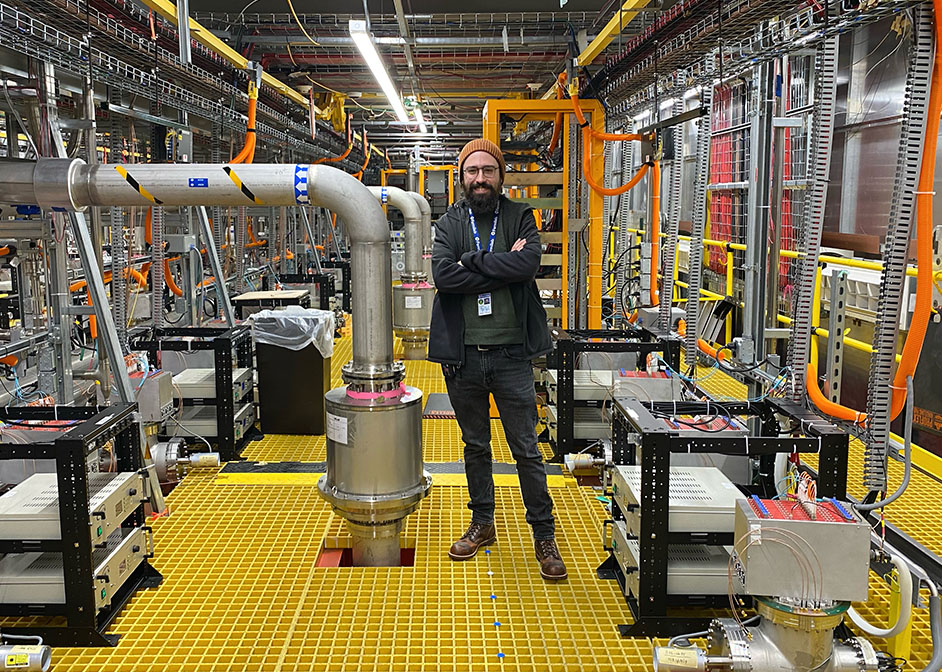Anthony Wood Working to Uncover Mysteries of Neutrinos in Particle Physics
Scientists have worked for years to unravel the mysteries of our universe.
Anthony Wood, a doctoral candidate in the Department of Physics at the University of Houston, is no different.

Wood is collaborating with researchers at the Fermi National Accelerator Laboratory in Illinois on a project that is examining tiny particles known as neutrinos. Neutrinos are the most abundant massive particles in the universe. The particles are smaller than electrons, do not possess electric charge and rarely interact with other atomic particles. The properties of particles are measured by the way they interact with each other, making neutrinos difficult to detect and challenging to study.
At Fermilab, Wood is working with the Imaging Cosmic and Rare Underground Signals (ICARUS) experiment. The project combines a cutting-edge detector technology with two neutrino sources, the Neutrinos at the Main Injector (NuMI) beam and the Booster Neutrino Beam (BNB). Both help to unlock the mysteries of neutrinos, a difficult task due to their low interaction probability.
“My goal during my time at the lab is to learn from experts about the ways our software is used to understand what our detector readouts can tell us about the neutrinos that interacted within it, a key task to advance the overall experiment,” said Wood.
Fellowship at Fermilab
Wood was awarded a Graduate Student Research Award from the Department of Energy’s (DOE) Office of Science Graduate Student Research (SCGSR) Program to conduct research at Fermilab. He is one of 87 graduate students representing 33 states who received the award in 2023.
The year-long fellowship provides financial support for Wood while giving him the opportunity to conduct his research in collaboration with world-class scientists at the national laboratory that hosts this cutting-edge experiment.
“We’re working together to try to understand the fundamental aspects of how our universe works,” said Wood.
Established by the DOE, the SCGSR Program aims to enhance the training and education of graduate students in science, technology, engineering and mathematics (STEM) fields.
NuMI and ICARUS Time Projection Chamber
NuMI is a beamline that produces an intense beam of neutrinos by directing protons onto a graphite target. A spray of exotic particles exits the target and is focused by large electromagnets before they decay into neutrinos and other particles. The beam is then sent through the Earth’s crust where the other particles are absorbed, but the elusive neutrinos continue on a path toward the detector located a half-mile away.
“Only a tiny fraction of these neutrinos interact within the detector and can be measured, but there are enough for us to study their properties,” said Wood. “I’m trying to understand our simulation of the number of neutrinos that pass through our detector and how well we expect to measure them.”
This involves taking the information gathered when neutrinos interact with the detector as well as their actions before crossing paths with the detector.
“It’s like trying to reconstruct the actions of someone who left footprints in the snow,” said Wood.
ICARUS uses a time projection chamber (TPC) to measure the interaction products of neutrinos. They cannot be observed directly, but their properties can be inferred by the visible particles that come out of the interaction. The TPC is a sophisticated detector that captures the interactions of particles, including neutrinos, with unprecedented precision. This technology, only available in a lab like Fermilab, allows scientists to study neutrino properties in detail.
Advancing Knowledge of Neutrinos
Another goal of Wood’s research is to reveal insights into the role of neutrinos in the cosmos. He hopes his work will have a heavy influence in the field of particle physics.
“We’re studying neutrinos because we think they hold keys to the way the universe evolved and how nature behaves,” said Wood.
The collaboration between NuMI and ICARUS is crucial for advancing our understanding of neutrinos. By measuring particle interactions with high accuracy, Wood and other researchers can analyze the data to unravel the mysteries surrounding neutrino behavior. This has implications for our comprehension of the fundamental forces and particles that govern the universe.
Wood’s fellowship at Fermilab runs through June. When he returns to Houston, he plans to defend his dissertation and prepare a new graduate student to continue the work after he graduates.
- Chris Guillory, College of Natural Sciences and Mathematics